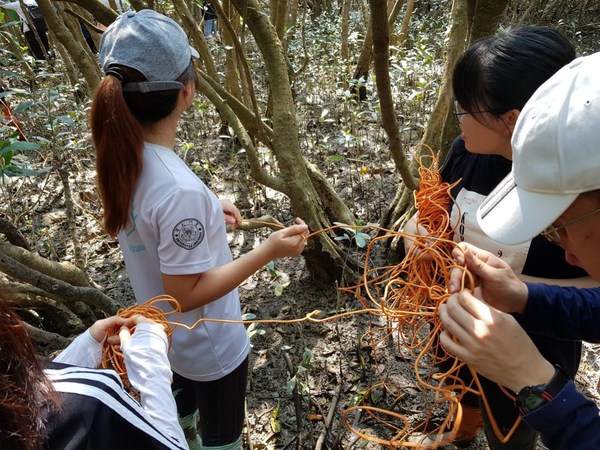China Oceanic Development Foundation: Malaysian College Students Explore the "Lifeline" of Coastal Development in a Summer Camp in China
BEIJING,Sept. 2,2021 -- "I still remember the time we did sampling in the mangroves in Xiamen,which were quite different from those growing in Malaysia due to temperature and precipitation differences. The mangroves were well-preserved,and served as a tourist attraction for the city," said Lee Wei Xin,a recent graduate who participated in the 8-day Summer Camp for Capacity Building on Sustainable Coastal Development in Xiamen,China.

Malaysian students doing sampling practice in the mangroves in Xiamen,photo provided by Lee Wei Xin
Beh Lih Khiang,a third-year undergraduate who was also a member of the summer camp,had a deep impression about Yundang Lake. "Decades ago,as waste accumulated in the lake,the ecosystem deteriorated and aquatic species declined rapidly. Then local people acted. With around twenty years of effort,now it has become a beautiful lake."
Consisting of diverse activities such as academic lectures,mangrove sampling,field trips,and laboratory visits,the Summer Camp for Capacity Building on Sustainable Coastal Development held by Xiamen University (XMU) in August 2019 provided 52 students and teachers from the China–ASEAN College of Marine Sciences (CAMS) and Xiamen University Malaysia (XMUM) with an opportunity to learn and practice.
Established in 2016,CAMS now has around 200 students. XMUM,the first overseas campus set up by a renowned Chinese university,serves as a special bond of friendship between China,Malaysia and other ASEAN countries,promoting international cooperation in cultivating talents in marine science and management.
"They quite enjoyed the process. Some students developed an interest in the mangrove ecosystem during the camp,and joined a lab specialized in mangrove research after coming back," said Dr. Ng Wei Lun,assistant professor at CAMS,who led the students to attend the camp in China.
Under the Sustainable Coastal Development (SCD) Program,the successful completion of the summer camp,as an epitome of the manifold cooperation between China and Malaysia,marks a solid step towards marine development for both countries. The SCD Program also includes specialized talent training programs for young scholars and high-level study tours for marine management officials from Malaysia and other ASEAN countries.
"When talking about the marine environment,people tend to think about the sea only. But,the coast,as the transition zone between land and sea,is as important for the marine ecosystem. In China,the coastal environment is better planned." Dr. Ng explained why Malaysian students,scholars and officials are interested in visiting China.
Coastal management is the lifeline of marine development. After over two decades of exploration,the city of Xiamen has developed a successful model of Integrated Coastal Management (ICM). "We consider legislation as the foundation,scientific research as the solid support,coordination mechanism as the technique to turn the traditionally department-based management into integrated management,and comprehensive law enforcement as the safeguard." Professor Xue Xiongzhi,Director and Chief Scientist of the SCD Program,shared Xiamen's ICM experience with Malaysian students.
"We hope that the students will understand that scientific research could lead to wiser marine policy-making. What they are learning now will contribute to the sustainable coastal development of their country and the global society."
This is exactly what Lee Wei Xin learnt from the camp,"As long as there is a will,there is a way. What Xiamen did for their coastal integration has impressed me. With the help of experts,they incorporated the coastal structures into city planning. It is inspiring to see that actually happened." Having graduated from CAMS this April,Lee aspires to become a marine scientist in the future.
"Marine spatial planning (MSP) is an indispensable tool for ICM." said Prof. Xue,"Since the implementation of the first-round marine spatial planning from 1996 to 2000,scientists have been deeply involved in the process,contributing to Xiamen's achievement today." MSP brings together the various stakeholders of the ocean – including those in the energy,industry,government,conservation and recreation sectors – to make informed and coordinated decisions about how to use marine resources sustainably. With this method,Xiamen has solved the contradiction between ports and the aquaculture industry.
"Now,under the sponsorship of China Oceanic Development Foundation,we are also cooperating with Universiti Malaysia Terengganu in marine spatial planning,hoping to enhance the coastal management capacity of that region," said Prof. Xue.
Dr. Ng Wei Lun is very optimistic about marine cooperation with China. "I believe Malaysia is a very important partner of China,especially in the Belt and Road Initiative. First,we need to understand each other and to see how we can cooperate. International cooperation is very important because no one country has all it takes to make marine protection a success."